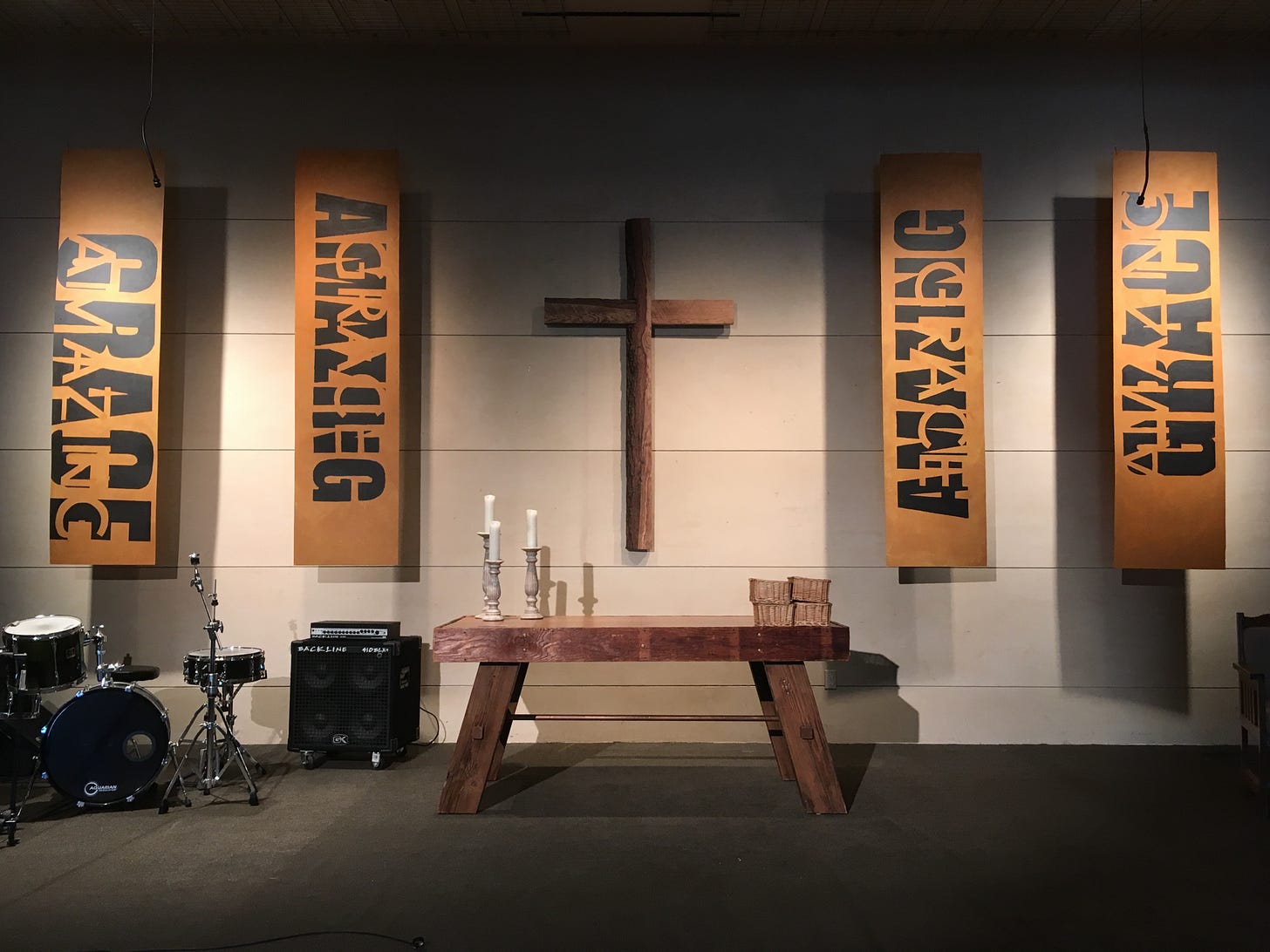The Secret of Church Success
Lost and Found 9: On Bell Curves and Growth Models, Just Declarations, and Michael J Fox.
(Ste Chapelle Chapel, Paris)
Happy anniversary! Just about 34 years ago, when my wife and I lived in our first apartment, before having children or cats, we started going to the lost church. We had been shopping around for churches for a month or so. The first contestant was a start-up congregation meeting in an elementary school cafeteria. Both of us came from “large” churches, with expansive sanctuaries and stained glass windows. The heavy oak pews were bolted to the ground; now we were sitting in Costco folding chairs. It all felt uncomfortable, impermanent.
We tried two established churches. One was housed in a modern building on a campus fully built out. It felt homey but insular. During worship, the pastor stuck a microphone in my face and had us introduce ourselves during worship. Wow was that was uncomfortable.
The second church was the one that would eventually absorb the lost church, but that was not in the cards back then. We came on the day they were dedicating their new worship space. The only person who greeted us was a visiting pastor we knew from our summer camp days. We felt completely ignored.
As it turned out, a couple whom we had known from the church where I grew up (and where I met my wife) lived down the street from our apartment. They invited us to something called “Dinner for Eight” - four couples from their church who met for dinner once a month. One of the clever aspects of this program was it allowed (perhaps encouraged?) members to invite new people as a way to introduce them to the church. It worked.
I can’t tell you much about that dinner other than the people seemed normal and we had a great time. So when we showed up the next day at church in yet another start-up meeting in an elementary school, we were prepared. The music was ok; the sermon was passable. But the people were so welcoming. We already knew eight of them from the night before, and they of course introduced us to others. When the pastor found out my wife had a background in music and choir, she was pretty much hired on the spot as the new church Director of Music. What were we thinking!
The church moved a year later to an elementary school closer to our mission area. Three years later we rented our first worship and office space. Ten years later we were on our own property, with a huge mortgage and two services totaling over 200 people. On Christmas Eve of 2004, we had three services with a total of 500 in worship. That was the top of the bell curve. If attendance is your only measurement of success, we had hit our peak.
I confess that I have a bad case of church envy. It seems that most every church I visit has their act together, even if it wasn’t a good fit for me. The huge church down the street has a bathroom that’s probably the size of the lost church’s worship space. On Easter weekend they had 6 worship services at the main campus. There were probably more people in the first 6 rows than we ever had in worship at the lost church.
Of course my usual reaction to churches like this is to mentally tear them down. They get people by pandering, or putting on a show, or adapting too much to the success culture we are living through. Their theology is weak, the sermons are “relevant” but hardly Biblical, and way too often they use that phrase “Does this make sense?” And all these things may be true. But I wish for a moment that we had what they have: enough money to make budget, a worship service we could be proud of, and lots of people. That sounds like success.
A few weeks ago we went to a local church that was not huge. They are currently meeting in a shopping mall in a space that was once a clothing store. There were lots of people, especially the much-coveted “young family” demographic. The service was long - too long, for my taste - and the whole thing felt scripted. The dark room, with its distressed wood and moody lighting looked like every other non-denom church in America. The band led the music and the people held their hands up in praise. The worship leader “declared” everything: “We just declare that Jesus is Lord,” “We declare that God is King of the Universe…” Everything was a declaration. And there was a lot of self-promotion - “This church has been so meaningful in our lives.” Another success story.
Why do some churches thrive while others die? It may be that we are all on our own life cycles, but just on different points on the bell curve. Take a look at this lovely diagram I found on-line:
I’m not sure how many of you have the privilege of being at a church for all of its phases. Most of us walk in somewhere in the messy middle, and if the trends I see are universal, many of us are attending churches on the right or “declining” side of the curve. Tony Morgan from the “Unstuck” group postulates that all churches go through these stages, unless they can somehow stay in the “sustained health phase.”
I’m intrigued with his idea about decline being associated with two factors: insider focus and “the steady creep of complexity.” The patio and coffee time after worship becomes your time to catch up with friends, while the visitor stands to the side, completely ignored. Every decision has to go through 12 people to get approval. The nimbleness and energy of the church has dimmed. We have lost our first love.
Morgan’s model and bullet points (found here if you’re interested: https://theunstuckgroup.com/church-lifecycle-comprehensive-guide/) hit the mark for many of the lost church’s struggles. My take is that churches, especially small churches, have a tendency to last about 2 generations. The first group of young adults comes in, bringing and birthing lots of kids who grow up in the church. They stop inviting people because all their friends are there at church. A younger generation follows, but in fewer numbers and perhaps lacking the will or fight to serve at the church. Then their kids graduate, leave town, and you’re left with a group in their 60’s and above. Young people might come to check out the church, but seeing no other children, child care, Sunday school, or youth group, they leave. The church continues to grey and decline. Deaths far outpace new members, and sooner or later the doors are locked and the property is sold off.
Some of you might remember the 80’s movie “The Secret of My Success,” where Michael J. Fox goes to Manhattan in a somewhat far-fetched rom-com. He sleeps with his aunt, deceives his uncle, and then takes over the company. He gets the girl, the job, and the money. Hard work and determination (and a little rule-breaking) is the secret to his success. Well, maybe on Wall Street or Hollywood Blvd.
What does it mean to have a “successful” church? Recently, some of my friends were talking about the role of “fame” in our church culture. The pastor talked about the four “B’s”: butts, budgets, buildings, and books. If the pastor can put butts in the seats, keep the budget in the black, maybe add a few buildings, all while promoting their most recent book, then you have achieved success. But what if you’re not interested in #celebritypastor? Can you still be successful by getting 50 people to show up on a Sunday, squeak by on budget, use the buildings you have, and allow someone else to write the books?
I wish it were so, but then we are confronted with the bottom line. A family or two leaves, and then there’s not enough money to make budget. Or if you’re lucky enough to make budget by renting out your classrooms to a preschool or other organization, you discover the sanctuary roof leaks, which is $200,000, and then you see that the inspector wants upgrades to the fire alarm system (another $20 grand) and you need an accessibility lift (another $10 grand). Oh, and did I mention the school that rents space from you found a better place down the road?
So your pastor gets burned out and there’s no one out there to replace them because who would want this shit job where you work 80 hours a week and no matter how hard you try, you make someone angry with each decision. The congregation want to grow but doesn’t want to change a thing. It’s enough to make your head spin and throw your hands up in surrender. Maybe we should stay home and watch TV on Sunday like every other family you know. Because this “carry-your-cross” kind of life is not easy, and when you skipped church for 12 months during Covid, the world did not fall apart.
Until it does. And then you need your support community, your meager faith to hold it all together. Those people you worship with on Sunday morning are with you when you need them most. They pray for you in times of need, and that old church building with the leaky roof becomes a true sanctuary. Because at its very root of this thing we call church is deep community, not budgets and butts in seats. The church is ideally a place where debts are met with untethered generosity, and the butts don’t stay glued to the pews - they’re too busy caring for the least of these in your neighborhood.
When life has you against the ropes, people show up and love you despite your shortcomings, in good times and in times of hardship. The struggles of life are pains you bear together. And there is laughter, too, found around the backyard table with a few bottles of beer. Church is that place where you can be totally honest and vulnerable and broken, yet still loved. So if you ask me what the secret of church success is all about, it’s found in the breaking of the bread and the pouring of the wine, a holy communion of saints and sinners, with the love of God and love of neighbor at its core. And that’s something even I can declare.








